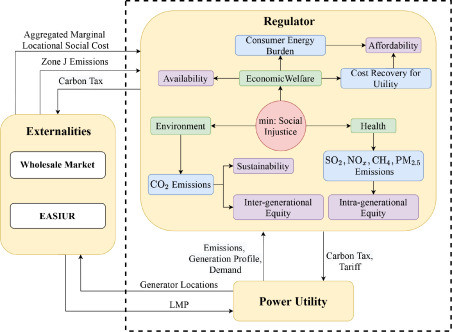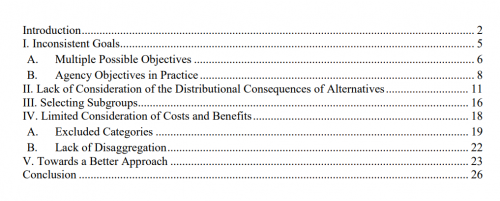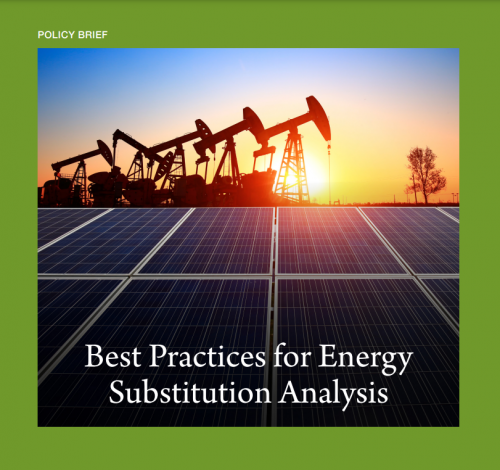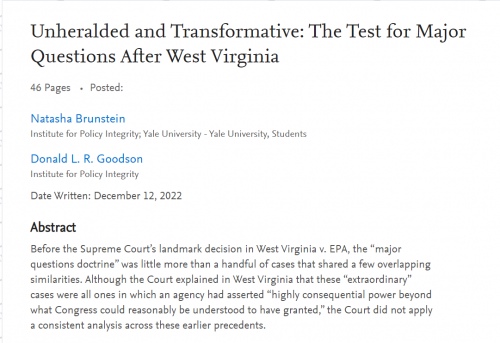-

Electricity Tariff Design via Lens of Energy Justice
Distributed Energy Resources (DERs) can significantly affect the net social benefit in power systems, raising concerns pertaining to distributional justice and equity. Current tariff design approaches suffer from opaque efficiency-equity trade-offs and are also agnostic of the externalities that affect both economic efficiency and equity. Therefore, this paper develops a justice-cognizant tariff design framework that improves the operational savings in the system without sacrificing distributional equity, and encompasses economic welfare, social costs of environmental and public health impacts, and socio-economic and demographic characteristics of electricity consumers. We evaluate four different tariff structures using a Multi-Objective Problem with Equilibrium Constraints. We then compare the operational savings and equity of the proposed framework using the 11-zone New York ISO and 7-bus Manhattan power networks. The results demonstrate that justice-cognizant, and spatially- and temporally-granular tariffs ensure equity and increase the operational savings at a lower energy burden to consumers.
-

Just Regulation: Improving Distributional Analysis in Agency Rulemaking
Forthcoming in Ecology Law Quarterly
This Article seeks to understand the shortcomings of current agency practice and outline what agencies can do better. To do so, it examines fifteen significant proposed or final agency rules promulgated during the Biden-Harris Administration’s first eighteen months and reveals four categories of limitations. First, agencies often pursue inconsistent goals across different regulatory initiatives. Second, they do not grapple with the core issue that distributional analysis should raise: the extent to which the better distributional consequences of one alternative should trump the higher net benefits of another alternative. Third, agencies do not apply a consistent approach to defining disadvantaged groups, which makes the analysis inconsistent and unpredictable. Fourth, the distributional analysis relies on a truncated set of costs and benefits, and thus presents an incomplete picture of the consequences of regulation on disadvantaged communities.
-
Comments on NRCS Agriculture Funding Strategy
Policy Integrity submitted comments to the U.S. Department of Agriculture's Natural Resources Conservation Service (NRCS) in response to its Request for Information about how it can most effectively distribute its share of Inflation Reduction Act funding. This $19 billion in funding, which is allocated across NRCS's core conservation programs, must be given out to support agricultural practices that reduce or sequester greenhouse gas emissions. Our comments encourage NRCS to award the funding to practices that will maximize net social benefits and to increase the transparency of its project-ranking process. We urge NRCS to consider a range of factors in its analysis, including a practice's potential to reduce greenhouse gas emissions, produce knowledge, and offer ecosystem services.
-
Comment Letter Calling for Rescission of DOE Categorical Exclusion Rule for LNG Exports
In response to the Department of Energy’s recent request for information on its categorical exclusions, we submitted a comment letter recommending that the Department rescind its 2020 regulation establishing categorical exclusion B5.7 for discretionary authorizations to export liquefied natural gas. As our comment letter explains, long-term expansion of export capacity may lock in fossil-fuel usage over the long term and thereby impede global decarbonization efforts. Yet when promulgating its categorical exclusion rule, the Department erroneously argued that indirect climate effects are not relevant to its assessment of applications for export authorization, and based its sweeping categorical exclusion on that improper legal conclusion. Our comment letter provides a proper understanding of the Department’s broad authority, which compels the agency to robustly consider impacts on climate change as part of its authorization process.
-
Shaping Connecticut’s Energy Storage Strategy
Energy storage can play an important role in a transition to clean energy, but only if it’s deployed within an effective policy framework. The Connecticut Public Utility Regulatory Authority (PURA) adopted our recommendations to target its energy storage incentives to areas with the highest differential between the highest and lowest marginal emissions rates so batteries could ultimately lead to reductions in emissions. In addition, PURA directed the Connecticut Green Bank to review our comments when setting the scope of the program's marketing plan.
-
Comments to PUCT on Wholesale Electricity Market Design
The Texas Public Utility Commission (PUCT) requested public input as part of an ongoing effort to ensure the reliability of its wholesale electricity market design following Winter Storm Uri. We submitted comments on how the PUCT can achieve its reliability goals in a manner that ensures just and reasonable rates for consumers. For any new mechanism it may deem necessary, we encouraged the PUCT to choose a design that accords with economic principles. Such a design would compensate both dispatchable and non-dispatchable resources according to their reliability value, include an efficient penalty structure for non-performance of generation units, reduce uncertainty for market participants, and mitigate market power exercise.
-

Best Practices for Energy Substitution Analysis
In recent years, numerous federal agencies have made a controversial claim: that projects locking in fossil fuels over the long term will decrease aggregate greenhouse gas emissions, or that their effects on total emissions will be limited. In many of those cases, however, agencies have reached this counter-intuitive conclusion using a flawed consideration of energy substitution. This report identifies some of the recurring problems with agency analysis of energy substitution and offers best practices to apply moving forward.
-
Amicus Brief in D.C. Circuit Defending BOEM’s Authority to Robustly Consider Climate Impacts in Offshore Leasing
Earlier this year, a group of environmental organizations successfully challenged an offshore oil-and-gas lease sale held by the Bureau Ocean Energy Management on the basis that BOEM inadequately assessed the impacts on climate change from the combustion of the fossil fuels that the lease sale would facilitate. In its appeal to the D.C. Circuit, the American Petroleum Institute countered that any analytical limitations were harmless because the Outer Continental Shelf Lands Act bars BOEM from considering climate-change impacts when administering leasing policy. Our amicus brief rebuts this argument and defends BOEM’s authority to consider downstream climate impacts in its administration of the offshore leasing program. Our brief explains that the consideration of downstream emissions is consistent with OCSLA’s text, legislative history, regulatory history, and caselaw.
-
Still Your Grandfather‘s Boiler: Estimating the Effects of the Clean Air Act‘s Grandfathering Provisions
Working paper
While vintage differentiation is a highly prominent feature of various regulations, it can induce significant biases. We study these biases in the context of New Source Review—a program within the US Clean Air Act imposing costly sulfur dioxide (SO2) abatement requirements on new boilers but not existing ones. In particular, we empirically investigate how the differential treatment of coal boilers shaped the generation landscape by affecting unit utilization, retirement, and emissions. Focusing solely on the additional SO2 emissions, we estimate annual costs of up to $65 billion associated with the vintage differentiation in New Source Review.
-

Unheralded and Transformative: The Test for Major Questions After West Virginia
Published in William and Mary Environmental Law and Policy Review
In West Virginia v. EPA, the Supreme Court expressly relied on the “major questions doctrine” for the first time in a majority opinion to hold that a federal agency lacked authority to issue a regulation. Published in the William and Mary Environmental Law and Policy Review, this paper explores whether West Virginia provides such a framework and concludes that it does. A close look at West Virginia and the alternative frameworks that parties and others urged on the Court in the West Virginia litigation also reveals a great deal about what the major questions doctrine is not.







